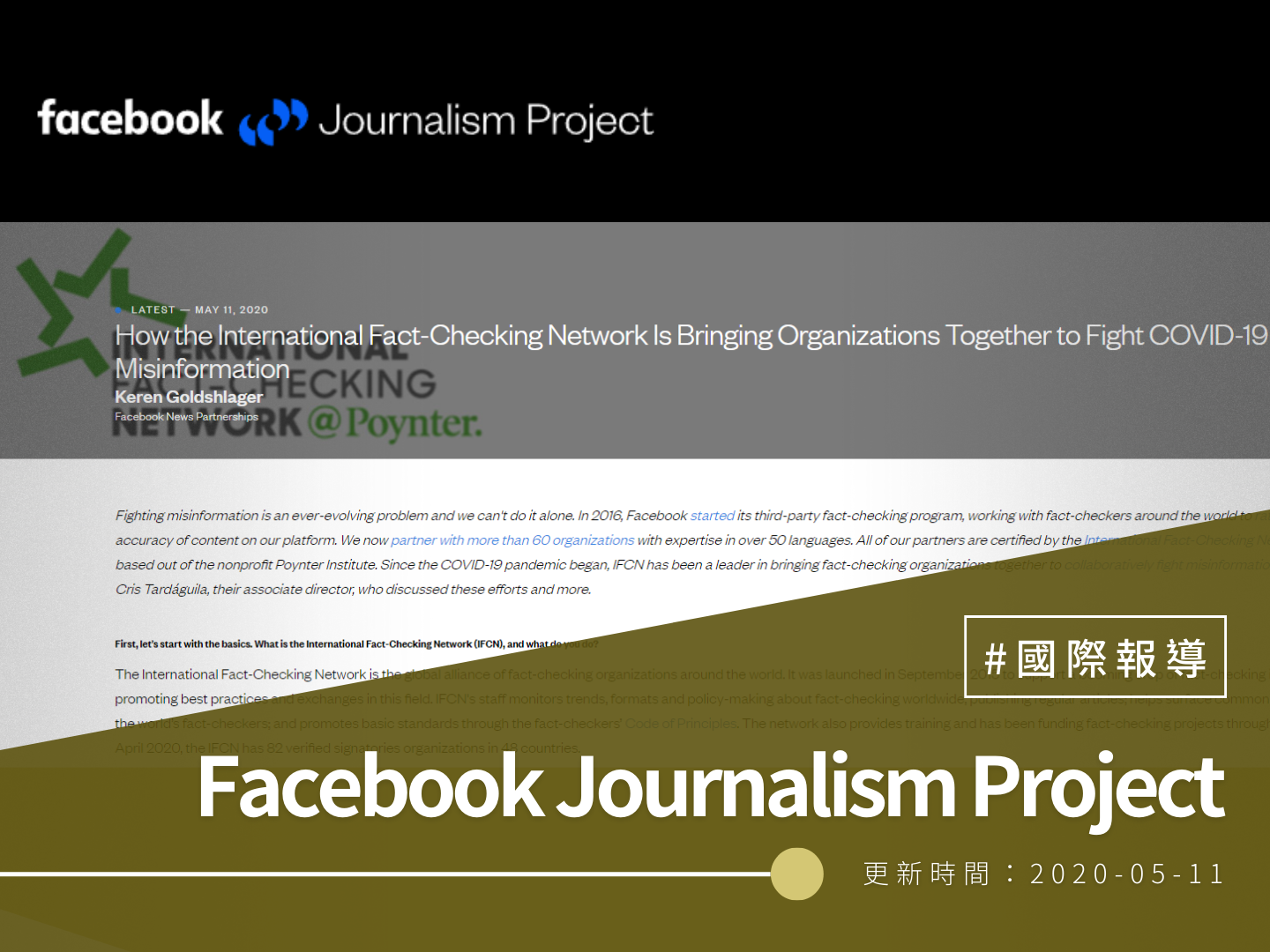【Facebook Journalism Project】How the International Fact-Checking Network Is Bringing Organizations Together to Fight COVID-19 Misinformation
【2020年 波因特學院/Facebook Journalism Project】
Keren Goldshlager
Facebook News Partnerships
Fighting misinformation is an ever-evolving problem and we can't do it alone. In 2016, Facebook started its third-party fact-checking program, working with fact-checkers around the world to rate and review the accuracy of content on our platform. We now partner with more than 60 organizations with expertise in over 50 languages. All of our partners are certified by the International Fact-Checking Network (IFCN), based out of the nonprofit Poynter Institute. Since the COVID-19 pandemic began, IFCN has been a leader in bringing fact-checking organizations together to collaboratively fight misinformation. We spoke with Cris Tardáguila, their associate director, who discussed these efforts and more.
First, let’s start with the basics. What is the International Fact-Checking Network (IFCN), and what do you do?
The International Fact-Checking Network is the global alliance of fact-checking organizations around the world. It was launched in September 2015 to support a booming crop of fact-checking initiatives by promoting best practices and exchanges in this field. IFCN's staff monitors trends, formats and policy-making about fact-checking worldwide, publishing regular articles; helps surface common positions among the world’s fact-checkers; and promotes basic standards through the fact-checkers’ Code of Principles. The network also provides training and has been funding fact-checking projects through grants. As of April 2020, the IFCN has 82 verified signatories organizations in 48 countries.
Misinformation can thrive during breaking news events, and the COVID-19 outbreak is no exception. In January, you started organizing the #CoronaVirusFacts Alliance, an effort to bring fact-checkers together to debunk hoaxes. What was the motivation for starting this alliance?
In the last week of January, fact-checkers in Taiwan contacted the IFCN worried about the amount of misinformation they were seeing related to the new virus and wondered if the same was happening in other countries. The IFCN shared this question with the community and realized that at least 30 fact-checking units worldwide were facing the same issue. It was clearly time to collaborate. So, on Jan. 24, the CoronaVirusFacts Alliance was launched as a way to avoid fact-checkers duplicating work. By that time various theories related to the origins of the virus were trending.
How has the alliance’s work evolved as the COVID-19 pandemic has spread?
The alliance is growing, we started with 30 original members to 89 fact checking organizations in 70 countries across 43 languages. Its database is now public and can be used for free — with search, sort and filter features. The group is now active in 16 time zones, and the number of published fact-checks doesn't stop growing. On Jan. 30, the alliance offered 86 fact-checked articles. Two months later, on March 30, it had over 3,000 debunked pieces. The alliance has also managed to promote a few global campaigns. As of April 13, the alliance had already published 12 detailed reports, pointing out different trends of the new coronavirus misinformation. They can be read at poy.nu/alliance.
Practically speaking, what have you learned about effective tactics for fact-checkers to communicate with one another and share information across geographies and time zones?
A collaborative project of this size needs strong coordination — and the IFCN has been playing this role. When news breaks or we hear of an important event about COVID-19, our staff sends out alerts to the community to make sure all members of the CoronaVirusFacts alliance are ready to face a possible change in the misinformation trend. The IFCN also reviews all fact-checks that are produced and shared to guarantee their quality (no typos, no grammar mistakes, and credible sources). The IFCN also sends alerts when there is different official information circulating about a COVID-19 topic. The ibuprofen case is a good example. In some countries, health authorities were in favor of its use. In others, they were against it. So fact-checkers needed to know and reflect that in their reporting. For all of these reasons, IFCN's staff members have been available on different channels (including, Slack, email, FB Messenger and WhatsApp) and reading a lot about the new coronavirus mis/disinformation.
In addition to debunking misinformation about COVID-19, what tactics have you seen fact-checkers utilize to promote reliable information?
Fact-checkers are distributing their fact-checks in different formats. Many of them have launched video strategies, and some are doing Instagram and Facebook lives. The use of tech solutions and the number of online media literacy campaigns have also improved. In some countries, fact-checkers were even called to advise health authorities and governments on creating campaigns against COVID-19 falsehoods. On April 2, the IFCN announced the 1st batch of the CoronaVirus Fact-Checking Grant and supported 13 projects focused on fighting COVID-19 hoaxes; and on April 30, we announced the 2nd batch of grant recipients, supporting 8 projects.
What can the broader news industry learn from collaborations like this one? How could the news ecosystem be collaborating even more around coronavirus?
Collaboration is the keyword in the battle against mis/disinformation, and the CoronaVirusFacts alliance has shown significant benefits. The news industry doesn't need two or three reporters to write the same article. One reporter/fact-checker can be responsible for getting it done and then sharing it with others. Duplication isn't smart in times like these.






